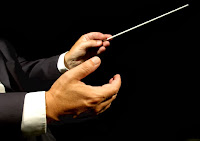
In fact, they have often been included as "liner notes" in LP albums.
There was a day when researching a musical piece that liner notes would be a primary source about a piece of music.
I haven't seen too many included in recent CD purchases.
That's too bad.
~*~*~*~
By means of explanation, program notes are included in the paper program handed out at concerts. They provide information about a work's composer, a description of the music to be heard, as well as background or trivial information that might be associated with the work.
Sometimes program notes are written by the composer. These are my favorites for they give the most insight into the work.
Other times, the program notes are written by the conductor of the program. These are very good for they not only give factual information, but also the insight of the person recreating the work of the composer.
~*~*~*~
When I attend symphony concerts I find that I will read about a work as it is being played (if it is light enough to read - otherwise I read it all before the concert begins). I like having that background knowledge about the music as I listen to the music.
I also find I don't want it to be just about the music. I like knowing what the composer was up to - where he was, jobs he might have held, etc.
I like hearing about premieres of works, especially those that might have been chaotic or poorly received. I think sometimes our 21st century ears are not as shocked by works that caused chaos at first performances. Though, I admit to being rather amused during concerts of music that startles the audience with forte sections. Seeing them jump nearly out of their seats is funny.
If they'd read the program notes they could have expected it. :)
~*~*~*~
Tonight I prepared program notes for a small program tomorrow. Nothing extensive, but something to add interest to the program for the listeners. Names and countries of origin for the composers, a description of the pieces - mainly Renaissance dances.
Very basic.
*I* want to learn more, but didn't go overboard for this event. This audience does not require more than I've already accumulated.
I have to remind myself that while I can making this a teaching moment it does not require a lecture.
One of those times when "less is more."
~*~*~*~
I've often felt I would like to prepare program notes as a side job. Sure if I got paid it would be great, but I would do it even if I didn't.
I think it's the music nerd in me.
I like learning about musical topics.
Program notes are little capsules of musical information.
Perfect for someone like me!


